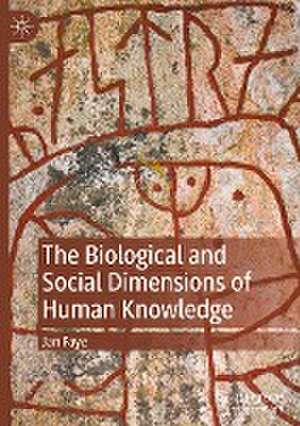The Biological and Social Dimensions of Human Knowledge
Autor Jan Fayeen Limba Engleză Hardback – 2 oct 2023
The purpose of this book is to demonstrate that natural selection has adapted human sense impressions to deliver reliable information without meeting the traditional commitments for having knowledge. In connection with memory, sensory and bodily information provides an animal with experiential knowledge. Experiential knowledge helps an animal to navigate its environment. Moreover, experiential knowledge has different functions depending on whether the deliverance of information stems from the organism’s external or internal senses.
Preț: 730.97 lei
Preț vechi: 891.43 lei
-18% Nou
Puncte Express: 1096
Preț estimativ în valută:
139.87€ • 146.34$ • 116.19£
139.87€ • 146.34$ • 116.19£
Carte tipărită la comandă
Livrare economică 02-16 aprilie
Preluare comenzi: 021 569.72.76
Specificații
ISBN-13: 9783031391361
ISBN-10: 3031391365
Pagini: 315
Ilustrații: IX, 315 p.
Dimensiuni: 148 x 210 mm
Greutate: 0.54 kg
Ediția:1st ed. 2023
Editura: Springer Nature Switzerland
Colecția Palgrave Macmillan
Locul publicării:Cham, Switzerland
ISBN-10: 3031391365
Pagini: 315
Ilustrații: IX, 315 p.
Dimensiuni: 148 x 210 mm
Greutate: 0.54 kg
Ediția:1st ed. 2023
Editura: Springer Nature Switzerland
Colecția Palgrave Macmillan
Locul publicării:Cham, Switzerland
Cuprins
Preface.- Chapter 1: Naturalized Epistemology.- Chapter 2: Knowledge as a Natural Phenomenon.- Chapter 3: Experiential Knowledge without Beliefs.- Chapter 4: Sensory Knowledge in Humans.- Chapter 5: Linking Experiences to the Social World.- Chapter 6: Self-awareness, Language, and Empirical Knowledge.- Chapter 7: Social Knowledge, Agreements, and Testimonies.- Chapter 8: Science and its Epistemic Limits.- Chapter 9: Theoretical Understanding in a Naturalistic Setting.- Conclusion.
Notă biografică
Jan Faye is Emeritus Professor of Philosophy in the Department of Communication at the University of Copenhagen.
Textul de pe ultima copertă
Traditionally, philosophers have argued that epistemology is a normative discipline and therefore occupied with an a priori analysis of the necessary and sufficient conditions that a belief must fulfill to be acceptable as knowledge. But such an approach makes sense only if human knowledge has some normative features, which conceptual analysis is able to disclose. As it turns out, philosophers have not been able to find such features unless they are very selective in their choice of examples of knowledge. Much of what we intuitively think functions as knowledge, both in human and non-human animals, does not share these normative features.
The purpose of this book is to demonstrate that natural selection has adapted human sense impressions to deliver reliable information without meeting the traditional commitments for having knowledge. In connection with memory, sensory and bodily information provides an animal with experiential knowledge. Experiential knowledge helps an animal to navigate around in its environment. Moreover, experiential knowledge has different functions depending on whether the deliverance of information stems from the organism’s external or internal senses.
Jan Faye is Emeritus Professor of Philosophy in the Department of Communication at the University of Copenhagen.
The purpose of this book is to demonstrate that natural selection has adapted human sense impressions to deliver reliable information without meeting the traditional commitments for having knowledge. In connection with memory, sensory and bodily information provides an animal with experiential knowledge. Experiential knowledge helps an animal to navigate around in its environment. Moreover, experiential knowledge has different functions depending on whether the deliverance of information stems from the organism’s external or internal senses.
Jan Faye is Emeritus Professor of Philosophy in the Department of Communication at the University of Copenhagen.
Caracteristici
Challenges our common understanding of human knowledge Explains the development of knowledge in animals and human beings Tells you about the cognitive limits evolution puts on human knowledge
